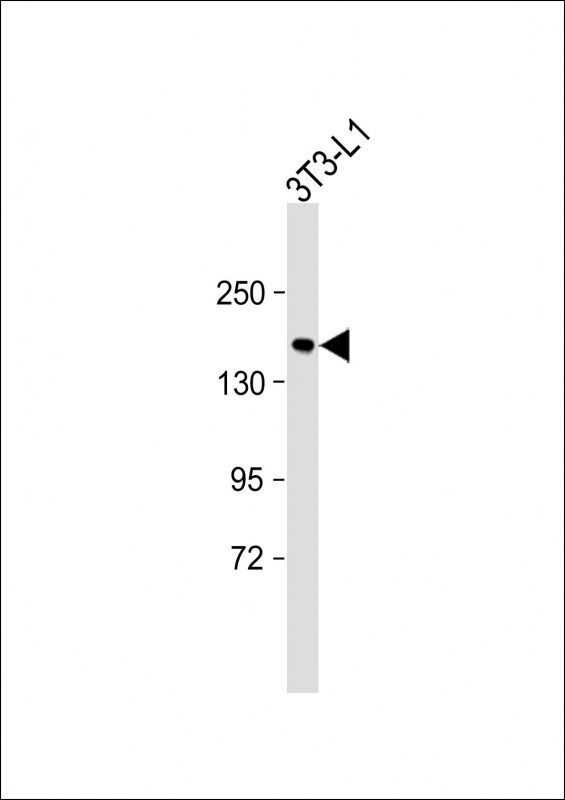
| WB | 咨询技术 | Human,Mouse,Rat |
| IF | 咨询技术 | Human,Mouse,Rat |
| IHC | 咨询技术 | Human,Mouse,Rat |
| ICC | 技术咨询 | Human,Mouse,Rat |
| FCM | 咨询技术 | Human,Mouse,Rat |
| Elisa | 咨询技术 | Human,Mouse,Rat |
| Aliases | Reversion-inducing cysteine-rich protein with Kazal motifs, hRECK, Suppressor of tumorigenicity 15 protein, RECK, ST15 |
| Entrez GeneID | 8434 |
| WB Predicted band size | 106.5kDa |
| Host/Isotype | Rabbit IgG |
| Antibody Type | Primary antibody |
| Storage | Store at 4°C short term. Aliquot and store at -20°C long term. Avoid freeze/thaw cycles. |
| Species Reactivity | Human, Mouse, Rat |
| Immunogen | This RECK antibody is generated from rabbits immunized with a KLH conjugated synthetic peptide between 430-456 amino acids from the Central region of human RECK. |
| Formulation | Purified antibody in PBS with 0.05% sodium azide. |
+ +
以下是关于RECK抗体的3篇代表性文献,包含文献名称、作者及摘要核心内容:
---
1. **文献名称**:*The RECK gene is a novel inhibitor of matrix metalloproteinase-9 (MMP-9) activity in human cancers*
**作者**:Takahashi C, et al.
**摘要**:该研究首次克隆了RECK基因,发现其编码的蛋白通过抑制MMP-9的活性,抑制肿瘤细胞侵袭和转移。研究使用RECK抗体证实其在多种癌细胞系中表达下调,且与患者预后不良相关。
---
2. **文献名称**:*RECK suppresses hypoxia-induced MMP-9 activation and tumor metastasis*
**作者**:Morioka H, et al.
**摘要**:文章揭示RECK在低氧微环境中通过抑制MMP-9的活化抑制肿瘤转移。通过RECK抗体检测发现,RECK表达水平与乳腺癌患者生存率呈正相关,提示其作为潜在预后标志物。
---
3. **文献名称**:*RECK expression in gastric carcinoma: Correlation with invasion and prognosis*
**作者**:Omura T, et al.
**摘要**:研究利用RECK抗体检测胃癌组织中RECK蛋白表达,发现其低表达与肿瘤浸润深度、淋巴结转移及患者不良预后显著相关,表明RECK是胃癌进展的关键调控因子。
---
如需更多文献,建议在PubMed或Web of Science中检索关键词“RECK antibody”或“RECK biomarker”。
**Background of RECK Antibody**
The RECK (Reversion-inducing Cysteine-rich protein with Kazal motifs) antibody is a vital tool in cancer research, targeting the RECK protein, a membrane-anchored glycoprotein known for its tumor-suppressive properties. Initially identified for its ability to reverse oncogenic transformation, RECK regulates extracellular matrix (ECM) remodeling by inhibiting matrix metalloproteinases (MMPs), including MMP-2. MMP-9. and MMP-14. These enzymes are critical for tumor invasion, metastasis, and angiogenesis, making RECK a key modulator of cancer progression.
RECK is downregulated in various cancers (e.g., breast, lung, colorectal) due to promoter hypermethylation or oncogenic signaling pathways (e.g., Ras, Myc), correlating with poor prognosis. Its restoration suppresses tumor growth and metastasis in preclinical models, highlighting its therapeutic potential.
RECK antibodies are primarily used to detect RECK expression levels in tissues or cell lines via techniques like Western blotting, immunohistochemistry, or flow cytometry. They aid in studying RECK's functional roles, regulatory mechanisms, and interactions with signaling pathways. Additionally, these antibodies contribute to exploring RECK as a biomarker for cancer diagnosis or prognosis and in validating experimental models targeting RECK for anticancer therapies.
Research on RECK antibodies continues to advance understanding of ECM dynamics and cancer biology, offering insights into novel therapeutic strategies aimed at controlling MMP activity and tumor microenvironment modulation.
(Word count: 242)
×